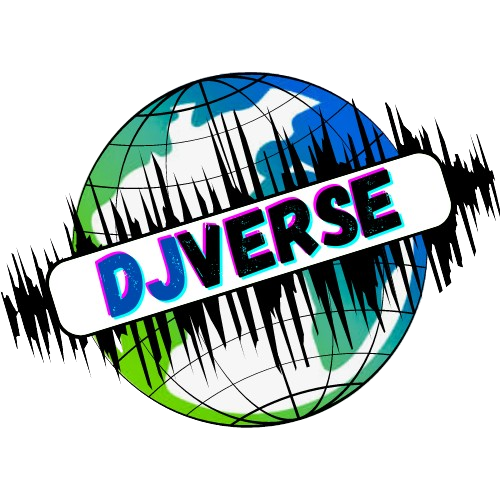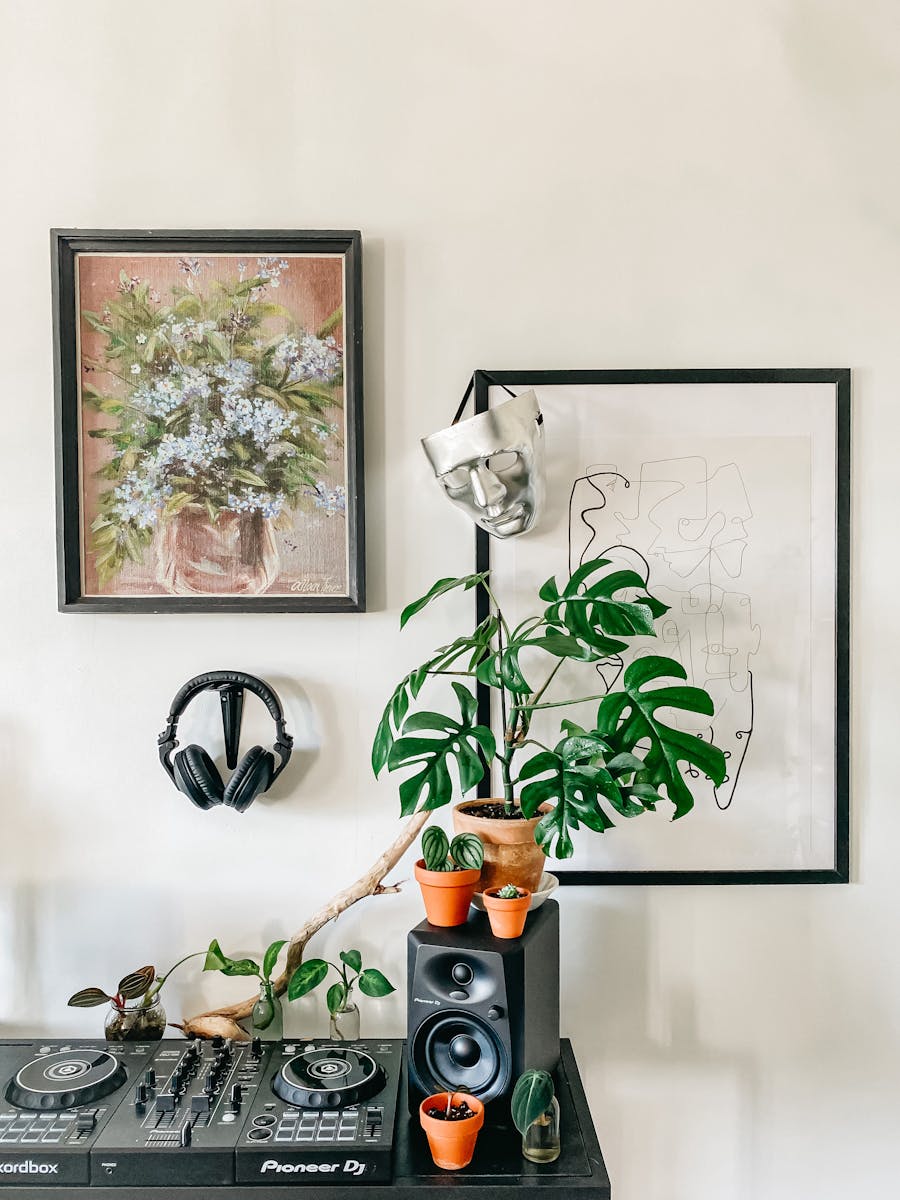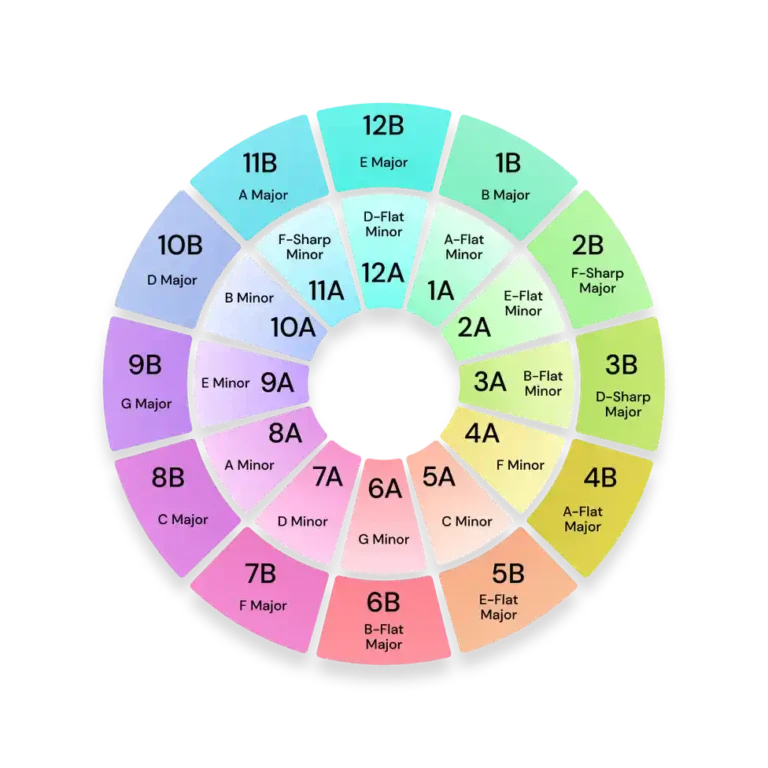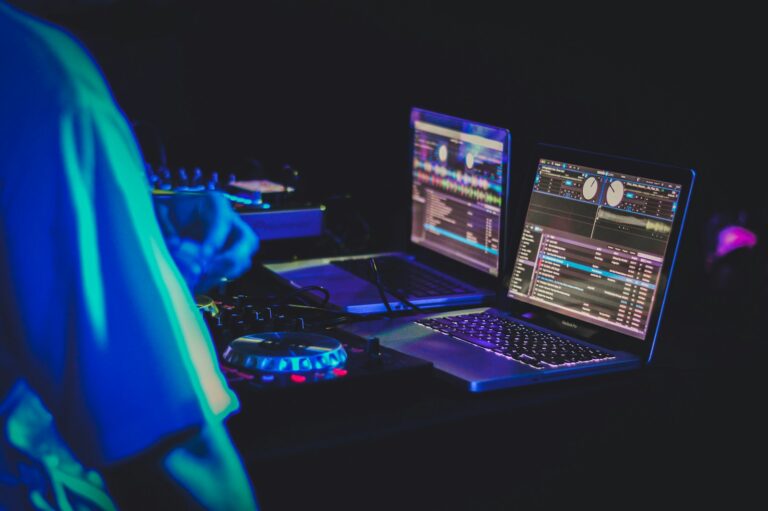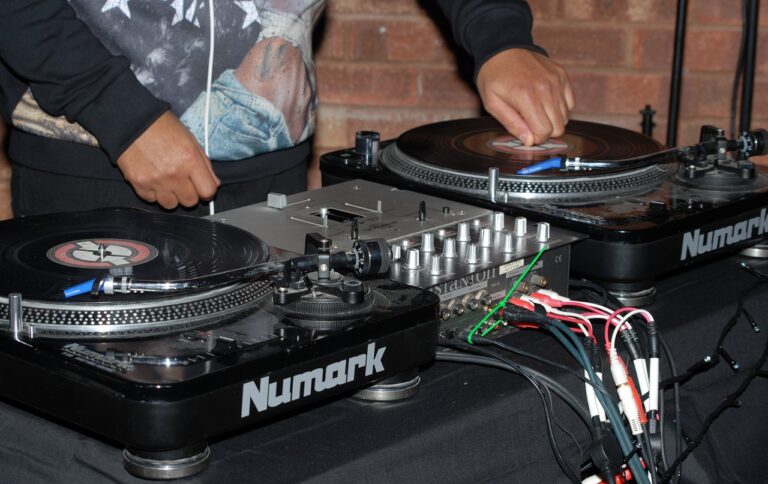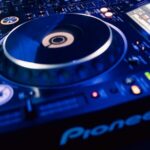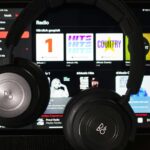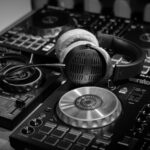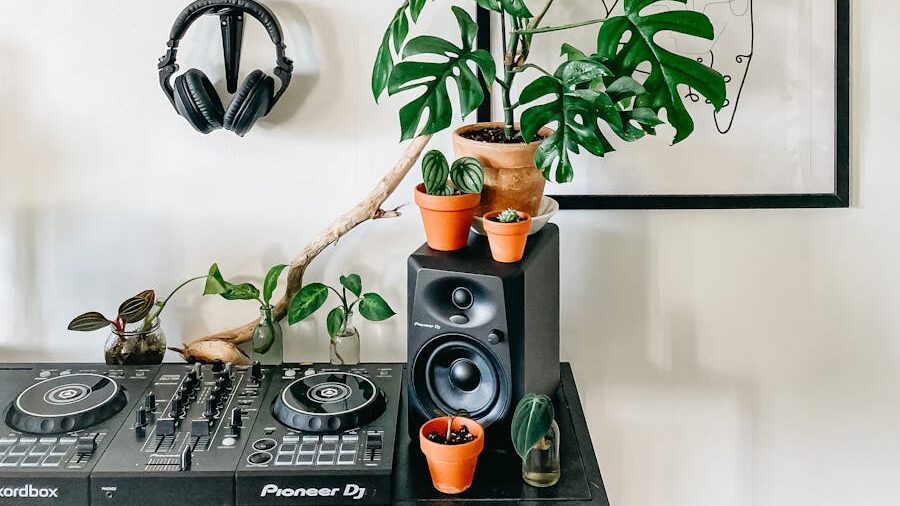
Are you ready to drop the beat and start your DJ journey? Did you know that 69% of professional DJs started their careers mixing in their bedrooms? That’s right – your home DJ setup could be the launchpad for your future in music!
In this guide, we’ll walk you through everything you need to know about creating the ultimate home DJ setup. Whether you’re a complete novice or looking to upgrade your current gear, we’ve got you covered.
Let’s dive in and turn your space into a mini-club that’ll have the neighbors wondering where the party’s at and,hopefully, not calling the cops!
Essential Components of a Home DJ Setup
Before we get into the nitty-gritty, let’s break down the key elements that make up a home DJ setup:
- Controller or CDJs: This is the heart of your setup. A DJ controller is an all-in-one device that connects to your computer and allows you to mix tracks, while CDJs are standalone units that play digital files or CDs.
- Mixer: If you’re not using an all-in-one controller, you’ll need a mixer to blend your tracks seamlessly.
- Headphones: These are your personal monitors, allowing you to cue up tracks and beatmatch without the audience hearing.
- Speakers: You’ll need a good pair of speakers to feel the music and hear how your mix sounds to your audience.
- Laptop or music source: This is your digital record crate, storing all your tracks and running your DJ software. If using CDJ’s or turntables, the CD’s or the records are the music source, but make sure you have plenty of space to store them all!
- Audio interface: This device connects your gear to your computer, ensuring high-quality sound output.
Now that we’ve got the basics covered, let’s dive deeper into each component and how to choose the right gear for your home DJ setup.
Choosing the Right DJ Controller for Beginners
For most beginners, an all-in-one DJ controller is the best way to start your home DJ setup. These devices combine mixer controls, jog wheels (for cueing and scratching), and various performance pads all in one unit. When choosing your first controller, consider the following:
- Budget: You can find decent entry-level controllers starting around $250, while more advanced models can cost $1000 or more.
- Software compatibility: Make sure the controller works with your preferred DJ software.
- Features: Look for essential features like pitch faders, performance pads, and effects controls.
Popular brands for beginner DJ controllers include Pioneer DJ, Numark, Denon and Traktor. The Pioneer DDJ-400 is a fantastic option for those just starting their home DJ setup journey, offering a great balance of features and affordability.
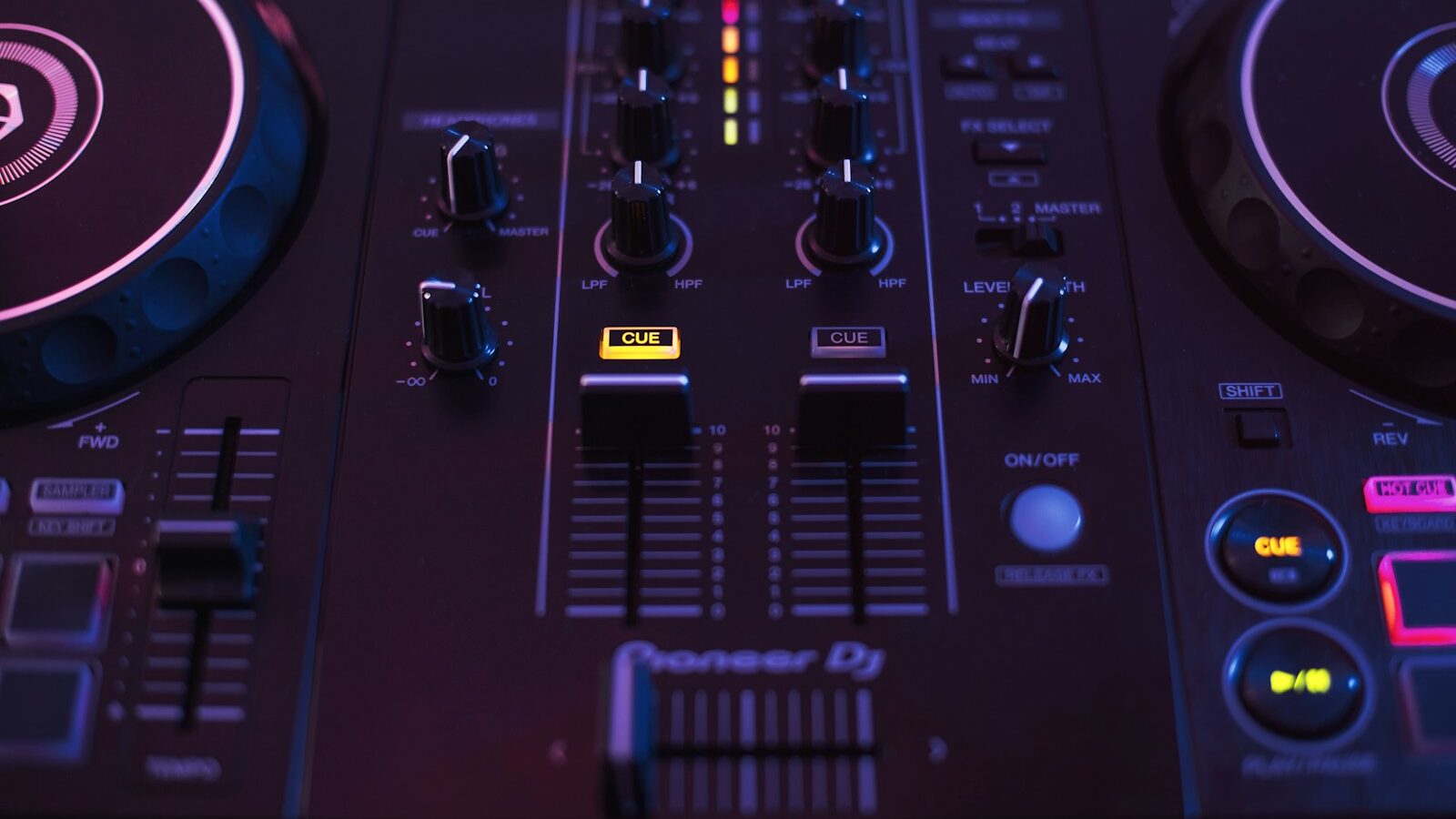
Mastering Your Home DJ Software
Your DJ software is just as crucial as your hardware in a home DJ setup. It’s where you’ll organize your music, create playlists, and access various mixing tools. Popular options include:
- Serato DJ
- Rekordbox
- Traktor Pro
- Virtual DJ
When setting up your software, focus on these key areas:
- Music library organization: Create a system for tagging and categorizing your tracks. This will make it much easier to find the right song in the heat of the moment.
- Beatgridding: Learn how to set and adjust beatgrids in your software. This will help with automatic syncing and make manual beatmatching easier.
- Hot cues and loops: Practice setting hot cues and loops on your tracks. These tools can help you create more dynamic mixes and smooth transitions.
- Effects: Experiment with different effects, but remember – less is often more!
Creating the Perfect DJ Booth in Your Home
Now that you’ve got your gear, it’s time to set up your home DJ booth. Here are some tips to create the ideal mixing environment:
- Ergonomics: Position your gear at a comfortable height. Your controller should be at about elbow level when you’re standing.
- Soundproofing: If you’re in an apartment, consider some basic soundproofing. Acoustic panels can help absorb sound, and a thick rug can reduce vibrations.
- Lighting: Add some LED strips or a small disco ball to set the mood. Just make sure you can still see your gear clearly!
- Cable management: Keep your cables tidy and organized. This not only looks better but also prevents tripping hazards and makes troubleshooting easier.
Remember, your home DJ setup doesn’t need to be perfect from day one. Start with the basics and upgrade as you go along!
Upgrading Your Home DJ Setup: From Bedroom to Semi-Pro
As you progress in your DJ journey, you might want to upgrade your home DJ setup. Here are some additions to consider:
- CDJs and standalone mixer: This setup, while pricier, is closer to what you’ll find in clubs.
- Effects units: Standalone effects units can add a new dimension to your mixes.
- Drum machines: These can spice up your sets with live percussion elements.
- Turntables: If you want to explore vinyl or use timecode systems, adding turntables to your home DJ setup can be a game-changer.
- Monitor system: Upgrade your speakers to studio monitors for clearer, more accurate sound.
- Video Camera: This will enable you to livestream your sets online. You can do this legally in places such as Mixcloud and Soundcloud for a small monthly fee.
Remember, upgrades should be based on your needs and style. Don’t feel pressured to buy gear just because it’s “pro-level” – the best home DJ setup is the one that works for you!
Troubleshooting Common Home DJ Setup Issues
Even the best home DJ setup can run into problems. Here are some common issues and how to solve them:
- Audio latency: If you’re experiencing a delay between your actions and the sound, check your audio buffer settings in your DJ software. A lower buffer size reduces latency but requires more processing power.
- Ground loop hum: This annoying buzz can occur when you have multiple devices plugged in. Try using a ground loop isolator or ensure all your gear is plugged into the same power strip.
- Level balancing: Take time to properly set the gain levels on each channel of your mixer or controller. This will ensure consistent volume across all your tracks.
- Connectivity issues: Always have spare cables on hand, and regularly check your connections. Sometimes, a simple unplug-and-replug can solve mysterious problems!
Practice Techniques to Improve Your DJ Skills at Home
Having a home DJ setup is great, but it’s what you do with it that counts! Here are some practice techniques to elevate your skills:
- Build your collection: Regularly add new music to your library, and take time to listen to each track carefully.
- Master beatmatching: Even if your software can sync automatically, learning to beatmatch by ear is an essential skill. Learn More
- Practice transitions: Work on smooth transitions between different tempos and genres.
- Record your mixes: Listen back to your practice sessions and identify areas for improvement. You can do this easily in digital DJ software mentioned above.
- Join online communities: Connect with other DJs online to share tips, get feedback, and stay motivated.
Remember, consistent practice is key. Even 30 minutes a day on your home DJ setup can lead to significant improvements over time!
Conclusion
There you have it – your roadmap to creating an epic home DJ setup that’ll make you feel like you’re headlining a festival, right from your bedroom! Remember, the most important ingredient in any setup is you and your passion for the music. Start with the basics, practice regularly, and don’t be afraid to experiment.
Your DJ setup is more than just a collection of gear – it’s your personal creative space. It’s where you’ll spend countless hours honing your craft, discovering new music, and developing your unique style as a DJ. Whether you’re dreaming of playing massive festivals or just want to be the life of your house parties, it all starts here, with your home DJ setup.
So, what are you waiting for? It’s time to plug in, power up, and let the music take control. Your DJ journey starts now – let’s make some noise! You could start DJing for less than $300 (£230)
Remember, every great DJ started somewhere, and for many, that somewhere was a humble home DJ setup. Myself and co creator, Kyle, both have home DJ setups and they have been the lifeblood of us learning to DJ.
With dedication, practice, and a love for the music, there’s no limit to where your home DJ setup could take you. Who knows? You might just be the next big name in electronic music. Now go get set up!
